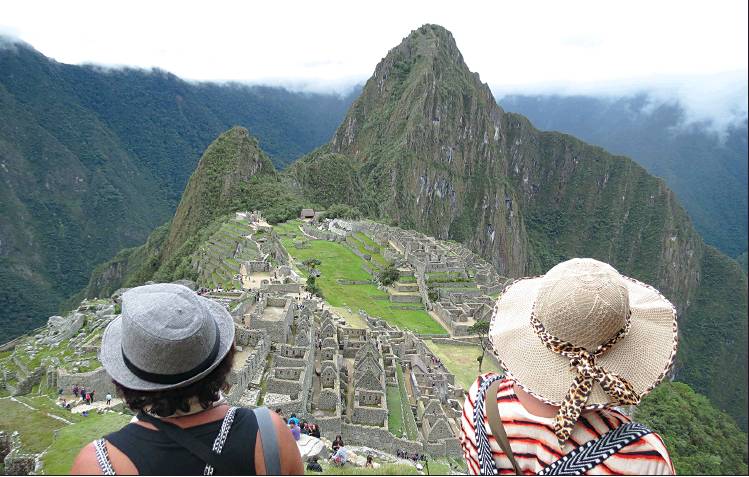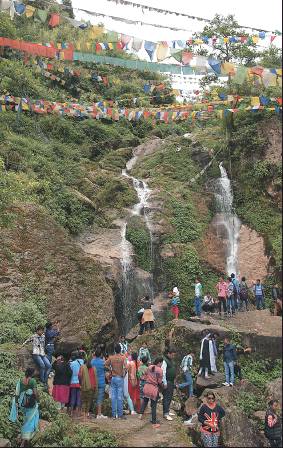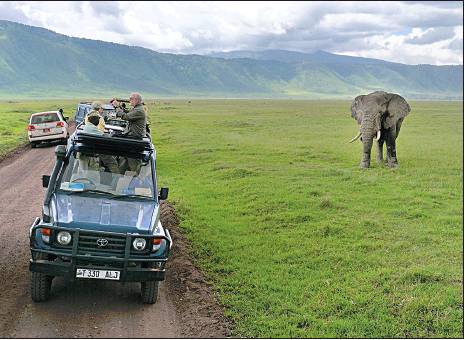UN sponsors ‘sustainable tourism’
Year of Sustainable Tourism shows how global travel can make positive impact
BY MARIA BENEVENTO MBENEVENTO@NCRONLINE.ORG
Responsible for 10 percent of the world’s gross domestic product, one in 11 jobs globally, and 5 percent of world carbon dioxide emissions, tourism will inevitably have a serious impact on people and the environment.
This year, the United Nations is trying to ensure that impact is a positive one, partnering with companies, nonprofits and countries around the world to sponsor the International Year of Sustainable Tourism for Development.
Vacation “cannot be a pretext either for irresponsibility or for exploitation,” Cardinal Peter Turkson, prefect of the Vatican’s Dicastery for Promoting for Integral Human Development, said in an Aug. 1 message for World Tourism Day. “In fact, it is a noble time in which everyone can add value to one’s own life and that of others.”
Turkson added that the Vatican supports the U.N. World Tourism Organization definition of “sustainable tourism”: tourism that respects people’s heritage, personal dignity and labor rights as well as the natural environment.
While tourism can contribute to problems such as human trafficking and overuse of resources, the Year of Sustainable Tourism attempts to show how these problems can be reversed, making tourism a vehicle for conservation, economic mobility and greater understanding among nations.
U.N. World Tourism Organization materials say tourism can contribute to all 17 of the U.N.’s sustainable development goals, a list of objectives that aim to “end poverty, protect the planet, and ensure prosperity for all” by 2030.
For individual tourists who want to help, the U.N. World Tourism Organization’s pamphlet, “Tips for a Responsible Traveler,” provides advice such as “choose tourism operators with environmental policies and community projects in place” and “respect human rights and protect children from exploitation.”
Putting this into practice requires careful research, though, as good intentions are not enough.
When hotels claim to be sustainable, “it might mean that they use recycled paper but nothing else,” said Pauline Frommer, editorial director of travel guide company Frommer’s. “So the tourist has to be a little bit knowledgeable.”
Both Frommer and the Year of Sustainable Tourism website point out that in some circumstances tourism can protect biodiversity by providing financial incentive to leave natural areas intact.
But benefits to the environment are not automatic. Saul Greenland, marketing manager of travel company Responsible Travel, said air travel is so environmentally destructive that his company avoids the misleading phrase “sustainable tourism.”
However, Responsible Travel tries to mitigate negative effects on the environment by advising people against irresponsible hiking, biking and wildlife-watching. It encourages positive effects on the economy by promoting support of local businesses rather than international chains.
The company supports tourism despite concerns about air travel because “10 percent of the world’s population (including many in developing countries where tourism is growing fast) depend on the industry,” Greenland said in an email to NCR.
Meanwhile, nonprofit Friends-International strives to educate people about the dangers well-intentioned but misinformed “voluntourism” poses for children.
“We have a lot of people who are simply unaware of how ineffective, or indeed harmful, their actions can be,” James Sutherland, international communications coordinator for Friends-International, said in an email to NCR.
He explained that increased tourism to Cambodia has fed the orphanage “industry” where, instead of being supported to stay with their families, non-orphans are put in institutions that use them to draw visitors’ donations and expose them to abuse from unscreened volunteers.
Sutherland recommends that volunteers choose a placement carefully based on the community’s needs and their own skills. His organization’s ChildSafe campaign, recognized by the U.N. on their page of “solutions” to tourism-related issues, also advises travelers on protecting children they encounter on trips.
ChildSafe and initiatives like the “The Code of Conduct for the Protection of Children from Sexual Exploitation in Travel and Tourism,” which helps companies establish policies and training that protect children, are also working to reverse the connection between tourism and human trafficking.
Good Shepherd Sr. Winifred Doherty, a nongovernmental organization representative to the U.N. who has experience combating human trafficking, said tourists should ask companies about policies regarding trafficking and can make a difference by “staying at and using services that do not exploit any person.”
Overall, tourists should “ask smart questions” to make sure the trips they plan are genuinely sustainable, said Geoff Bolan, CEO of Sustainable Travel International, a nonprofit that includes promoting the U.N.’s sustainable development goals as part of its mission.
Good questions include: “How does this help locals? How does this help/ hurt the environment? How many locals/nationals do you employ? How do you deal with the carbon footprint of this trip?” Bolan wrote in an email to NCR.
Frommer also emphasized the need for thoughtful tourists.
“Travel is not just a fun activity,” she said. “It’s also one that impacts not only the traveler but the places they are traveling to, and a responsible traveler is aware of that and travels in a way that is sensitive to the needs of the people that they’re visiting.”
[Maria Benevento is an NCR Bertelsen intern.]
ON THE WEB
International Year of Sustainable Tourism for Development www.tourism4development2017.org
Responsible Travel www.responsiblevacation.com
ChildSafe Movement: 7 tips for travelers thinkchildsafe.org/travelers
Sustainable Travel International sustainabletravel.org


